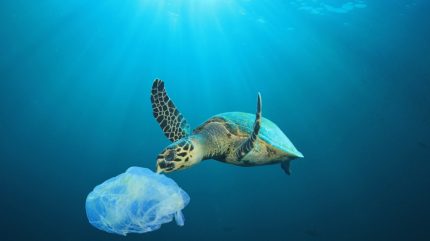
A new plastic developed by scientists in Japan dissolves in seawater within hours, offering a potential breakthrough in the global effort to reduce marine pollution.
Created by a team from the RIKEN Center for Emergent Matter Science and the University of Tokyo, the material disintegrates without leaving microplastics or toxic residue, addressing key challenges in plastic waste management.

Discover B2B Marketing That Performs
Combine business intelligence and editorial excellence to reach engaged professionals across 36 leading media platforms.
Seawater-soluble plastic breaks down within an hour
During tests at a laboratory in Wako city, near Tokyo, researchers demonstrated how a small piece of the plastic dissolved in a container of salt water after being stirred for around an hour.
The material, according to lead researcher Takuzo Aida, retains the strength of conventional petroleum-based plastics but decomposes into original components when exposed to salt.
These by-products are then broken down by naturally occurring bacteria, eliminating the risk of microplastic pollution.
The plastic is also designed to degrade in soil, albeit more slowly. A five-centimetre piece takes just over 200 hours to disintegrate in land-based conditions. Aida noted that the material remains stable when coated, allowing it to be used like conventional plastic products.

US Tariffs are shifting - will you react or anticipate?
Don’t let policy changes catch you off guard. Stay proactive with real-time data and expert analysis.
By GlobalDataThe team is now investigating optimal coating methods to improve its durability and applications.
New plastic could offer sustainable alternative for packaging
Although no commercialisation plans have been announced, the researchers say their discovery has generated interest from various sectors, particularly packaging.
The material’s biodegradability makes it a strong candidate for use in food and consumer product packaging, which are major contributors to single-use plastic pollution.
The plastic is reported to be non-toxic, non-flammable, and does not emit carbon dioxide during breakdown. These properties may make it suitable for broader use in environmentally sensitive contexts.
Given the widespread impact of plastic waste on oceans and marine wildlife, innovations like this are being closely watched by scientists, environmentalists, and industry stakeholders.
Global urgency to reduce ocean plastic waste
The announcement coincides with World Environment Day on 5 June, which this year centres on the theme “Beat Plastic Pollution.”
The United Nations Environment Programme has warned that plastic waste in the oceans could triple by 2040, reaching up to 37 million metric tonnes annually.
The environmental and health consequences of microplastics, now found in marine species and human bodies alike, have intensified calls for alternative materials.
“Children cannot choose the planet they will live on. It is our duty as scientists to ensure that we leave them with the best possible environment,” said Aida, reinforcing the growing ethical and scientific commitment to address plastic pollution.
With global awareness rising and pressure mounting on governments and industries, the search for sustainable materials is accelerating.
While the Japanese team’s seawater-soluble plastic is still in the research stage, its early results indicate a promising path forward in reducing reliance on conventional plastics and limiting long-term environmental harm.





